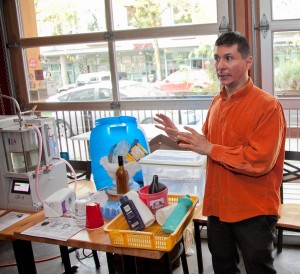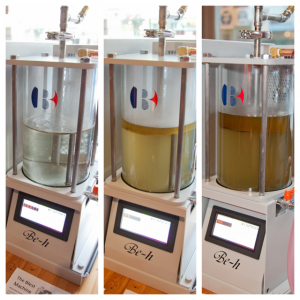By Kelsey May, September 27, 2013
Photos by Ann Slothower
On September 24, 2013, at the Rocky Mountain Flatbread Co. in Vancouver, the Upcycle the Gyres Society hosted the first public demonstration of its goal: convert land and ocean plastic waste into profit.
In four hours, the Blest Be-h machine, invented by Akinori Ito and purchased by Rocky Mountain’s owners, Dominic and Suzanne Fielden, converted one kilogram of the restaurant’s plastic waste into one liter of crude oil; which will be refined into kerosene, diesel, or gasoline. The Be-h can convert plastics 2, 4, 5, and 6 into crude oil that is 98% sulfur-free, meaning it has up to 50% less CO2 emissions than standard fossil fuel.
Rocky Mountain Flatbread Co. has been operating by triple bottom line standards for almost ten years by using organic ingredients, purchasing carbon credits, and teaching sustainability. This purchase, Mr. Fielden said, “just seemed like the right thing to do”. The morning he met with Jose Luis Gutierrez-Garcia, UpGyre’s project director and co-founder, Fielden was about to spend $12,000 on carbon credits for his restaurants. During the conversation, Fielden decided to buy a Be-h machine instead, which cost, coincidentally, the exact amount he was ready to part with an hour earlier. “Carbon off-sets are great,” Fielden said. “And I still purchase them. But this machine is a great investment. It’s going educate thousands of people.” UpGyres and RMFC have now partnered to educate children and adults about upcycling. RMFC will run the crude oil through the Be-h twice for restaurant use, but right now it’s serving as a visual aid for the RMFC Education society. The Be-h and Tuesday’s demonstration, Gutierrez-Garcia said, “helped UpGyres reach a milestone in our project development.”
The Be-h uses a gasification process to convert plastic to oil. Due to the lack of oxygen, no dioxins can form during the process. Heat separates the plastic into molecules, diverting crude oil into one container, carbon ash residue in another. The carbon ash residue has very low to no toxicity and can be sold to make concrete mixes or composted for gardens.
UpGyres knows plastic land waste can be converted into quality crude oil; however, marine waste could yield different results. Marine plastic has different levels of degradation, which could produce more acidic or alkaline oil and limit refining possibilities.
Manitoulin Transport will be giving two hundred kilos of marine plastic a free, 30-hour ride up to P & M Recycling in Whitehorse, Canada for a pilot conversion test. “Once the American Society of Testing and Materials determines the components and quality of the oil, we’ll know what we can use it for, and we will create a market for it.” Gutierrez-Garcia said.
The results should be back within two months. If this oil proves viable, the next two years will be dedicated to determining the feasibility of a commercial operation. The current plan: travel to the ocean’s five major gyres (and smaller ones like the Caribbean) on solar-powered ships equipped with Be-h machines. Drones will collect plastic to be converted into crude oil, at sea. Return to land where UpGyres refines, sells, and uses the oil to power its ships when necessary.
What about the inconvertible plastic? That, and actual waste will be collected and recycled or sold to companies like EcoAlf, who turn PET bottles (No. 1 plastics) into fabric for jackets, luggage, and more.
In order to do this, UpGyres needs to produce enough crude oil to stay in the black. “It is a matter of engineering,” he said. “If we need 500 tons of plastic cleanup a day [meaning, 400 thousand liters of crude oil processed] for the operations to have a reasonable payback time, then we will set our targets accordingly. Maybe we need more or less for the ship, drones, and crew to pay for themselves. The more oil produced annually will clean up the oceans faster and sooner.”
UpGyres anticipates the life expectancy of each gyre to be anywhere from 25 to 150 years depending on size and plastic accumulation. “That is, if we can manage to stop plastics on land from reaching the ocean.” Gutierrez-Garcia said. To help counter this UpGyres will also be running a land-based conversion operation.
**Rocky Mountain Flatbread Company’s Be-h machine will be on display demonstrating the conversion process at Science World in Vancouver from Sept 28-Oct 27.
Who is else converting plastic to oil?
http://www.blest.co.jp/index-english.html
http://www.recyclingtoday.com/Article.aspx?article_id=132381
For tips on reducing plastic use:
http://www.youtube.com/watch?v=ZQiqHgE0h3U
http://www.yesmagazine.org/planet/42-ways-to-not-make-trash
http://plasticpollutioncoalition.org/2010/12/tedxgreatpacificgarbagepatch-andy-keller/
For more information about the effects plastics have on the ocean:
Captain Charles Moore first discovered the Great Pacific Garbage Patch in 1997 and has been researching its effects on the ocean environment ever since.
http://www.ted.com/talks/capt_charles_moore_on_the_seas_of_plastic.html


